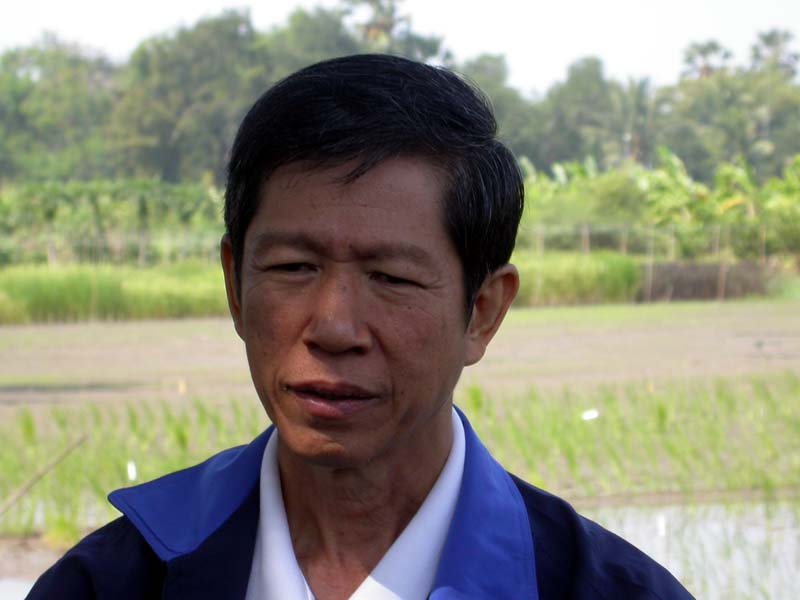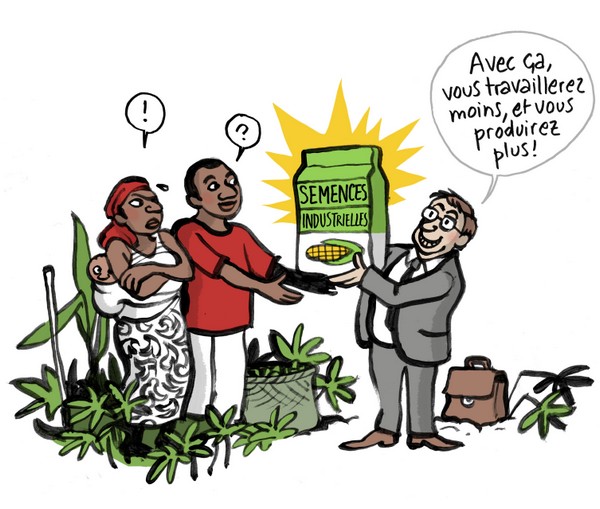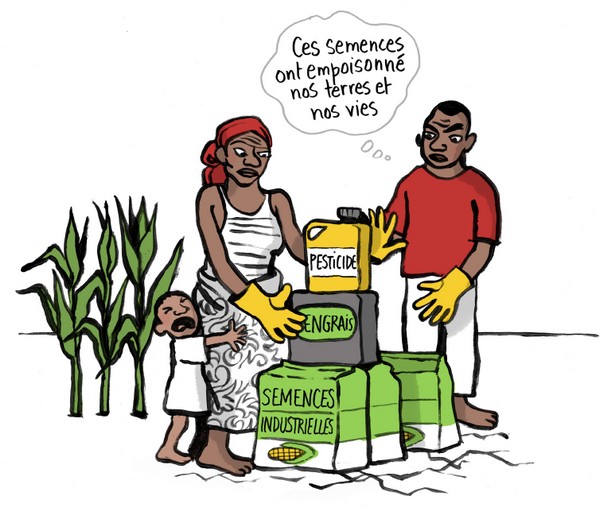Everything is connected:
agriculture, food, health, economics, politics …
Taking another look at an article in INFO OGM of April 7, 2016 by Christophe NOISETTE, we single out these words: “ The reduction could have gone even further, but the farming world did not have enough traditional seeds to meet the demand, therefore the forecast looks as follows for the following years.”
Indeed this is what thescaling down and abandon of Bt cotton looks like:
“There are three different cotton companies in Burkina Faso, ((SOFITEX, SOCOMA and FasoCoton). They possess all the cotton seed varieties in the country. Frustrated by the incapacity of Monsanto to identify and correct the cause of their lower quality, the companies have set a schedule for the gradual abandon of Bt cotton and a return to traditional national cotton cultivars. ” . The peak in Bt cotton cultivation was reached in the 2014/2015 season when 73% of cotton was GMO. The rate went down to 53% in 2015/2016 and is estimated to be further reduced to 30% in 2016/2017, before a complete abandon in the 2017/2018 season. It should be noted that all cotton seeds are exclusively distributed by the three cotton companies Sofitex, Sonoma and FasoCoton.
Indeed, if the Bt cotton of Monsanto has caused heavy losses for the three companies and the state of Burkina, why was it not totally abandoned in 2016? The answer is simple:
 The scaling down could have been even more substantial in 2015/2016, but there were not enough traditional seeds left to meet the demand and there is even now not enough to give up Bt cotton completely this year.
The scaling down could have been even more substantial in 2015/2016, but there were not enough traditional seeds left to meet the demand and there is even now not enough to give up Bt cotton completely this year.
Right, the answer is simple. But it needs a second look, because it reveals the threat looming over the entire seed stocks of the planet. If the three cotton companies had pursued their efforts to impose GMO cotton this year or in 2017, our traditional quality seeds would have vanished and the hope to reinstate the “Burkina Cotton” quality label would have disappeared.
In 2004, the International Year of Rice, there were approximately 140 000 rice varieties in the world, according to FAO estimates.
With the Green revolution the number of varieties grown inThailand went down from 16 000 to 37. And worse, there were only 2 varieties on half of the planted cotton fields. This sombre state of affairs calls for “ a concentration of main efforts to a return to local cultivation and traditional food systems - everything is connected, agriculture, food, health, economics, politics … ” It is neither Via Campesina nor indigenous organisations claiming this, but it is the FAO.
 Three multinationals, Syngenta, Monsanto and Dupont-Pioneer, control 50% of the seed market. The two first are also owners of large quantities of protected varieties, 50% of tomatoes sold in Europe and 70% of cauliflower. Monsanto and Syngenta,both large producers of pesticides, sell their products by packages, including fertiliser and adapted pesticides.. Moreover at the head of large selections they use sterile varieties. The perverse effect of this appropriation is the depletion of the number of varieties and thereby also genetic diversity.” And the farmer is impoverished !
Three multinationals, Syngenta, Monsanto and Dupont-Pioneer, control 50% of the seed market. The two first are also owners of large quantities of protected varieties, 50% of tomatoes sold in Europe and 70% of cauliflower. Monsanto and Syngenta,both large producers of pesticides, sell their products by packages, including fertiliser and adapted pesticides.. Moreover at the head of large selections they use sterile varieties. The perverse effect of this appropriation is the depletion of the number of varieties and thereby also genetic diversity.” And the farmer is impoverished !
Everything is connected, agriculture, food, health, economics, energy, politics …
As a farmer in Thailand told me in front of his field: “Before, I used chemical pesticides … and became indebted.” .
 He explained thatpreviously, he bought his seeds from a large companies together with the associated fertiliser and pesticides included. But, then he joined a group of “farmer researchers” which found varieties produced by farmers and with no need of either chemical fertiliser or pesticides. They use organic fertiliser and natural pesticides (made from charcoal ..) and have the same yields as with industrial varieties but without being poorer.
He explained thatpreviously, he bought his seeds from a large companies together with the associated fertiliser and pesticides included. But, then he joined a group of “farmer researchers” which found varieties produced by farmers and with no need of either chemical fertiliser or pesticides. They use organic fertiliser and natural pesticides (made from charcoal ..) and have the same yields as with industrial varieties but without being poorer.
But how write a newsletter on the risks to traditional farmer seeds without mentioning the pioneer Vandana Shiva? I do so in inviting you to visit the site Veterinary agronomists without frontiers and respond to the call from Vandana Shiva and Marc Dufumier.
Yes, everything is linked ! Agriculture, food, health, economics, energy, politics …
Paris, May 6, 2016
Maurice Oudet
Director SEDELAN
P.S. If your connexion allows you, you may take pleasure in viewing the excellent documentary“ La guerre des grains” (The Seed War) at the following site: https://www.youtube.com/watch?v=vGtGSFneI7o









